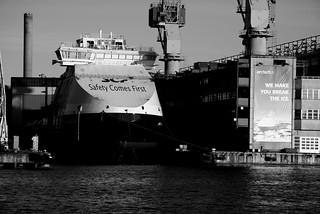Yesterday, when I was talking to one of my friends, she told me that you could see, across the various Facebook posts (my instagram pictures are usually sent across to my Facebook account), how I was getting better at the drawing all the time.
This made me happy for the obvious reasons of you’d like to think that as you do more of a thing, you get better. But this was also the friend with whom I had the original conversation of “I was never very good at drawing” where I realised that I got irate with people who said that about maths or languages and pointed out to myself, about art at least, that for most things, few people started out very good at anything, it was very much a learning by doing thing that got them better. And that I’d never given much time to art because “I was never very good at it”.
So the above is some approximation of Mount Fuji, done on a train last week or the week before. Let me tell you, drawing on trains in Ireland is not easy. The trains bounce quite a bit. You need to get the drawing bit done in Heuston before the train sets off. The painting bit, requiring a lot less precision, is okay.
I’ve found myself in conversations about learning Irish during the week and the message I have taken away from it is that many people, in Ireland at least, are unable to draw advantages from things they have to do, even when they don’t want to do it. When you point out those advantages, you get yelled at.
It is fair to say that usage of Irish is not particularly broad, but that’s not why anyone really learns it, and even if you never see yourself speaking Irish, there are tangible benefits to learning it as it has a lot of sounds that are just not in English which may be useful should you want to learn another language later.
What that language might be is also something you cannot dictate at the age of 4 or 5.
I don’t speak Irish on a day to day basis, mostly because an chaighdeán and I speak slightly different varieties and I just don’t understand the radio a lot. But I do speak French and German significantly more regularly and I am learning Finnish. Having learned Irish has fed into all three of those, especially the Finnish (as it happens). Knowledge is only wasted if you are the wasting type.
What saddens me most is the argument that education should be dictated purely by what most people are likely to need to earn money. Education should be directed towards equipping people to learn on an ongoing basis, and towards teaching them to think.
When I see a lot of arguments online in Ireland, I feel that in those two objectives at least, education has failed. Much of the argument also centres on how education has failed to provide adequate vocational training. If we focused on education like this, then arguably, 80 years ago, it was fair enough to get people out of school when they were 12, not worry too much if they could read or write, because sure, they weren’t ever really going to need it, were they?
We got to a space in our country where we provided an adequate basis for people to develop their own views on their lives and then move on. I sometimes feel that with a focus on what “industry needs” and “what people need for their careers” that we will lose that view of education, that it is a tool for living, and not just a tool for an employer.
Which brings me back to art.
It’s hard to make a living from art. Most people can’t. An awful lot (embittered photographer comment coming up) of people expect to be able to get art for free or “a credit, which will be good for you”.
Most of the people I know in the tech sector, so people who do the currently fashionable professions of tech related programming, network management or software design, system administration or whatever you’re having yourself, have developed hobbies which are fundamentally not tech focused. Anecdotally, for the women, it tends towards craft work, knitting, crochet, sewing, and for the men, it tends towards craft beer, and, wood turning.
This leads me to think that despite arguments that the tech sector can be very creative, in terms of designing solutions to problems, that creative side of things is not really tangible enough.
I regret massively that I did not take up drawing and painting at a much earlier stage in my life (and I’m going to write a couple of excuses in a moment).
Part of that is because there is, I think, a truth missing from our lives. It really doesn’t matter how good you are at something provided you are enjoying doing it. And if you focus on enjoying it, you may wind up getting good at it.
We are not all born to be Olympic champions but that’s not why people go running every day.
School is where we should be getting the fundamentals of these skills, the building blocks on which we can build stuff later. Anyone who knows anything at all about languages knows that you never stop learning. No one who is 40 years old today has a static command of their native language. Anyone who works in technology has an ever increasing set of use cases for various words whose meaning was actually reasonably set down prior to tech, eg, analyst, architect, and, let’s face it, computer. Yet, I suspect if someone popped up and suggested that the ability to draw might be a skill which should be part of a rounded education, the same arguments coming from the cohort who see no value in Irish for the simple reason that they were never very good at it (and didn’t bother trying) would be advanced in terms of art. This is a pity because it is predicated on the idea that people are born good artists. But drawing is a skill which can be acquired to some reasonable level.
When I went to school, there was a tendency of seeing some people as good at art, and some as less talent. In many respects, art was seen as a talent and less as a skill. People in my class were seen as good at drawing and the others…well. I was, for the most part, one of the others, bar on one occasion, when I drew a holiday scene, actually won a prize for it, and still had a teacher demanding to know why I didn’t colour in something which, in real life, was white.
In an act of rebellion, I coloured it in pink, when, age the age of 8, I lost that argument. Pink was about the one colour this thing was never going to be. Looking back now, I don’t much remember the praise.
I remember the surprise, the astonishment, that someone from the “Not good at drawing group” (but terribly good at maths and English) had produced something that didn’t look like a spider had been at a paint box. I retreated back to the maths and the English. It seemed somehow safer.
No doubt, there were others who retreated to something else from the maths and English. We all, as children, have our safe places.
There is research around that suggests that kids learn better when effort is rewarded rather than success. I don’t have a link to it handy but it’s particularly interesting in the context of other research which says in the US, in particular, children from Asian families have a view that working at maths will enable you to get better at maths, whereas in other groupings there is a view that you have to have some sort of leaning towards it. With the benefit of hindsight, I’m inclined to see some merit in that argument, and not just limited to maths.
As it happens, I did Mount Fuji twice, once in my watercolour book, and once as part of my inktober getting better at drawing notebook which isn’t so great for paints. This is how it looked first.
When my friends can actually recognise the places I am drawing, this makes me feel very good. Drawing is fun, and you can learn how to do it. The same is true of most things.


